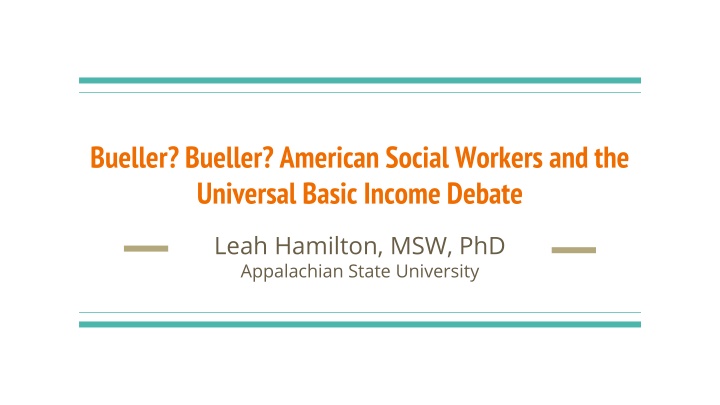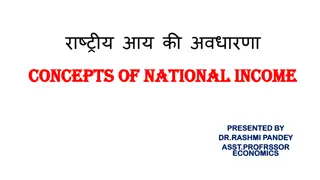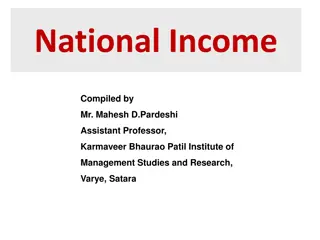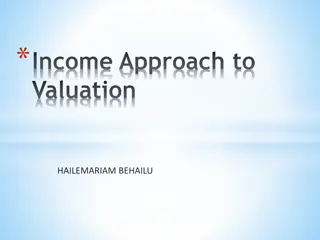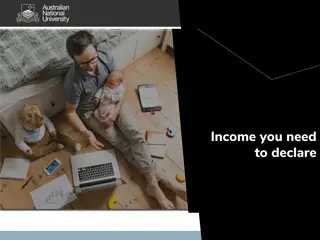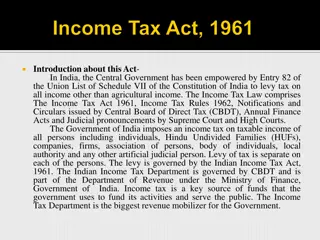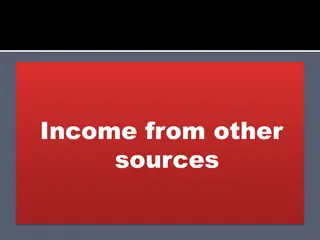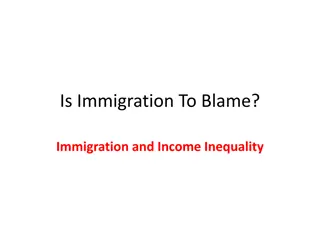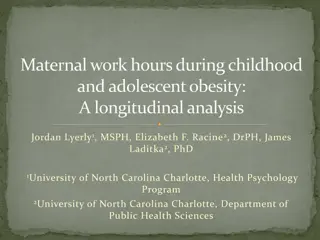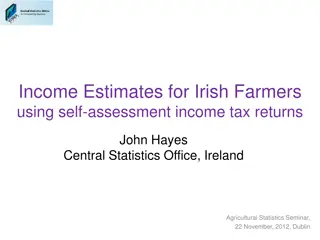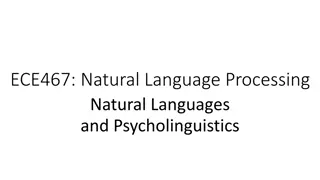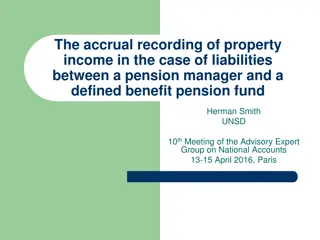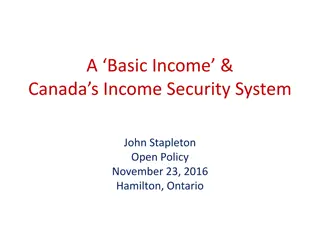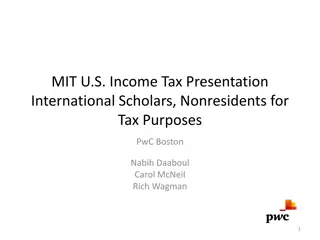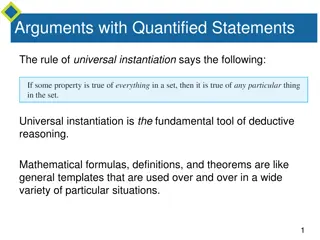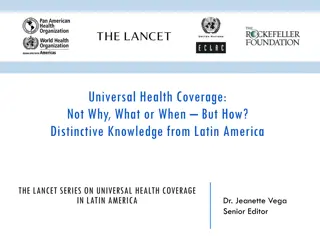Social Work Scholars' Perspectives on Universal Basic Income
Limited contributions from social work scholars on Universal Basic Income (UBI) were found in the literature review, focusing on themes such as UBI as an alternative to neoliberal welfare states, addressing labor market threats, and the social justice perspective.
Download Presentation

Please find below an Image/Link to download the presentation.
The content on the website is provided AS IS for your information and personal use only. It may not be sold, licensed, or shared on other websites without obtaining consent from the author.If you encounter any issues during the download, it is possible that the publisher has removed the file from their server.
You are allowed to download the files provided on this website for personal or commercial use, subject to the condition that they are used lawfully. All files are the property of their respective owners.
The content on the website is provided AS IS for your information and personal use only. It may not be sold, licensed, or shared on other websites without obtaining consent from the author.
E N D
Presentation Transcript
Bueller? Bueller? American Social Workers and the Universal Basic Income Debate Leah Hamilton, MSW, PhD Appalachian State University
Methodology/Literature Review - Basic income search in Social Work Abstracts (no date limit) yields three results, only one SW scholar - Caputo (2007) Search of top SW journals (Children and Youth Services Review, Journal of Child and Family Studies, Research on Social Work Practice, Social Service Review and Social Work): - Katz (1973): summary of UBI demonstrations of the era - Bell & Bushe (1975): discussed AFDC efficacy in context of UBI discourse Basic income search in Social Services Abstracts: - Caputo (2008): SW perspective on three main UBI perspectives (US) - Garfinkel (1982): insulation against poverty, expand economic incentives available to higher SES (US) - Mays & Marston (2016): UBI would incur liberating effects in response to neoliberalism (AU) - Mulvale (2008): Social justice/pragmatic arguments (CA) - Mulvale & Frankel (2016): social justice perspective on UBI in Canada (CA) - Sewpaul (2005): South Africa, similar conclusions to Garfinkel and Mays & Marston (S. Af.) - -
Findings Minimal contributions to the discourse by social work scholars Themes in limited social work UBI literature: - - - UBI as an alternative to neoliberal welfare state UBI to address labor market threats Social justice perspective on existing research
UBI as an Alternative to Neoliberal Welfare State - Punitive/paternalistic welfare systems in USA, Canada, Australia, UK - UBI would create emancipatory effects for welfare recipients who currently experience negative consequences [to] well-being and sense of self, self-identity and personhood under paternalistic social policies (Mays & Marston, 2016, p. 12). Poverty alleviation policies that don t alleviate poverty - 90% of applicant families in poverty before receiving AFDC, 80% remained in poverty - Social Security (a universal benefit for retirees) has been much more successful at poverty remediation - Qualifying for AFDC may be one of the greater misfortunes that could befall most young families (Bell & Bushe, 1975, p. 187). Work disincentive due to loss of benefits - Reducing benefits as income increases equivalent to 100% income tax (Garfinkel, 1982) - -
UBI to address labor market threats - Insulation against automation and unemployment - Canada and Australia: 40% of workers engaged in casual employment (hours change weekly and no benefits are provided) (Mays & Marston, 2016; Muvale & Frankel, 2016) - Canadian workers especially threatened by declining fossil fuel industry (Muvale & Frankel, 2016) - Almost American families classified as working poor, higher rates among African Americans groups (Caputo, 2007) - Work is not the necessarily the pathway out of poverty
Social Justice Perspective on Existing Research - - Poverty mediation should be primary goal of any UBI scheme (Caputo, 2008) Poverty reduction as a moral imperative, with cost-effective benefits: - Healthcare expenditures decrease, - Crime decrease, - Opportunity costs regarding taxbase contributions and workforce productivity (Caputo, 2008) Current economic model is dependent upon ever increasing production and consumption which is environmentally unsustainable (Mulvale & Frankel, 2016). -
Why Social Workers Should Consider UBI - Relative political appeal of universal programs - Social workers face constant political pressure against services to the poor - US TANF budget is $16.5 billion/year: 1996-today Unemployment/underemployment associated with: - higher rates of suicide and morbidity (Milner, Page, & LaMontagne, 2014; Roelfs, Shor, Davidson, & Schwartz, 2011) - addiction (Henkel, 2011) - intimate partner violence (Capaldi, Knoble, Shortt, & Kim, 2012) - poorer physical and mental health (Herbig, Dragano, & Angerer, 2013; Paul & Moser, 2009) -
Why Social Workers Should Consider UBI, cont. - Current Temporary Assistance to Needy Families program is ineffective. - 23% of poor families now receive assistance, compared to 68% in 1996. - Cliff effect : When families move above eligibility income, all benefits lost, removing work incentives - Most families leave the program due to time limits rather than gaining employment - Dehumanizing effect: - Lower marriage rates because marriage become economic calculation (Cherlin & Fomby, 2004) - Unconstitutional drug testing - Family caps intrude on the reproductive rights of poor and minority women - Work requirements push recipients to low wage, low benefit work (Lim, Coulton, & Lalich, 2009) - Asset limits create disincentives for savings (Hamilton, Alexander-Eitzman, & Royal, 2015)
Would replacing welfare with UBI leave poor families worse off? - CATO Institute: Annual benefits of hypothetical family receiving every public program in the US: $16,984 (MS)-$49,175 (HI) - TANF, SNAP, Medicaid, housing assistance, heating assistance (LIHEAP), WIC, and the Emergency Food Assistance Program (TEFAP) - Only 1/3 of low income families receive benefits from 3 or more assistance programs (Edelstein, Pergamit, & Ratcliffe, 2014) - Time limits means that the window is limited
Social Work Code of Ethics - Canadian Association of Social Workers in favor of UBI due to: - Potential administrative savings compared to current patchwork of social services - Stress [on recipients] of current unreliable nature of social programming (Kennelly, 2017) - US National Association of Social Workers is committed to social justice, self-determination, and dignity and worth of persons and ought to consider UBI.
References Bell, W., & Bushe, D. M. (1975). The economic efficiency of AFDC. Social Service Review, 49(2), 175 190. Capaldi, D. M., Knoble, N. B., Shortt, J. W., & Kim, H. K. (2012). A systematic review of risk factors for intimate partner violence. Partner Abuse, 3(2), 231 280. https://doi.org/10.1891/1946-6560.3.2.231 Caputo, R. (2007). Working and poor: A panel study of maturing adults in the U.S. Families In Society: The Journal Of Contemporary Social Services, 88(3), 351-359. Caputo, R. (2008). The unconditional basic income guarantee - Attempts to eclipse the welfare state. International Social Work, 51(4), 509. Cherlin, A. J., & Fomby, P. (2004). Welfare, work, and changes in mothers living arrangements in low-income families. Population Research and Policy Review, 23(5/6), 543 565. Cunha. J., De Giorgi, G., & Jayachandran, S., (2017). The price effects of cash versus in-kind transfers. Retrieved from https://www.povertyactionlab.org/sites/default/files/publications/467_The-Price-Effect-of-Cash-versus-In-kind- Transfers_July%202017.pdf Edelstein, S., Pergamit, M., & Ratcliffe, C. (2014). Characteristics of families receiving multiple public benefits. Washington, D.C: Urban Institute. Garfinkel, I. (1982). The economics of social welfare: Trends and strategies for the 1980 s. Administration in Social Work, 6(2-- 3), 61 71. Hamilton, L., Alexander-Eitzman, B., & Royal, W. (2015). Shelter From the Storm: TANF, Assets and the Great Recession. SAGE Open, 5(1), 1 6. https://doi.org/10.1177/2158244015572487 Henkel, D. (2011). Unemployment and substance use: a review of the literature (1990-2010). Current Drug Abuse Reviews, 4(1), 4 27.
Herbig, B., Dragano, N., & Angerer, P. (2013). Health in the long-term unemployed. Deutsches rzteblatt International, 110(2324), 413 419. https://doi.org/10.3238/arztebl.2013.0413 Katz, A. (1973). Four income maintenance experiments. Social Work, 18(2), 4-113. Retrieved from http://www.jstor.org.proxy006.nclive.org/stable/23712134 Kennelly, C. (2017). Universal Basic Income Guarantee: The Next BIG Thing in Canadian Social Policy. Ottowa, Ontaria: Canadian Association of Social Workers. Lim, Y., C. J. Coulton, & N. Lalich. (2009). State TANF policies and employment outcomes among welfare leavers. Social Service Review, 83(4), 525 555. Mays, J. M., & Marston, G. (2016). Reimagining equity and egalitarianism: The basic income debate in Australia. Journal of Sociology and Social Welfare, 43(3), 1. Milner, A., Page, A., & LaMontagne, A. D. (2014). Cause and effect in studies on unemployment, mental health and suicide: A meta- analytic and conceptual review. Psychological Medicine, 44(5), 909 917. https://doi.org/10.1017/S0033291713001621 Mulvale, J., & Frankel, S. (2016). Next steps on the road to basic income in Canada. Journal of Sociology and Social Welfare; Kalamazoo, 43(3), 1. Mulvale, J. P. (2008). Desperately seeking a new model of economic security for Canada: The basic income (BI) approach. Canadian Social Work, 10(1), 8. Paul, K. I., & Moser, K. (2009). Unemployment impairs mental health: Meta-analyses. Journal of Vocational Behavior, 74(3), 264 282. https://doi.org/10.1016/j.jvb.2009.01.001 Roelfs, D. J., Shor, E., Davidson, K. W., & Schwartz, J. E. (2011). Losing life and livelihood: A systematic review and meta-analysis of unemployment and all-cause mortality. Social Science & Medicine, 72(6), 840 854. https://doi.org/10.1016/j.socscimed.2011.01.005 Sewpaul, V. (2005). A structural social justice approach to family policy: A critique of the draft South African family policy. Maatskaplike Werk/Social Work, 41(4), 310 322.
